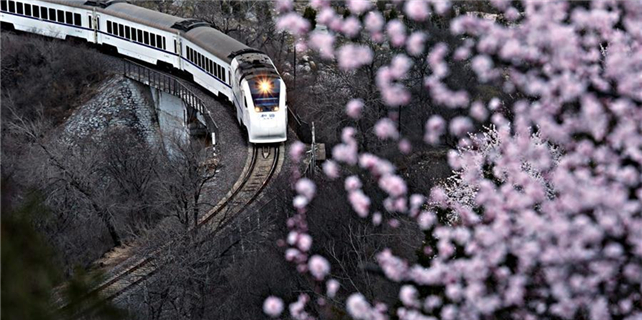At Taoist resort, peace prevails
In Jintan, Jiangsu province, a new tourist attraction looks a bit like Zhejiang's touristy Wuzhen, but with a regal and religious touch
It was like time travel, one afternoon in late November, when a group of tourists entered the Oriental Salt Lake Resort being built at the foot of Maoshan mountain, the Taoist holy mountain in Jintan, Jiangsu province.
A giant Taoist stone sculpture and a long, rugged stone wall greeted us at the resort. Soft, smooth Taoist music wafted through the air, adding to the atmosphere.
We were awestruck as we explored, walking along the resort's stone slab roads. One road gradually led us upward to where we could look down at small lakes and buildings. Yellow lights shone on gates, pavilions, inns and museums, for an ancient look - a magnificent view. Farther away, stretches of dark-green mountains hugged the resort.
|
Oriental Salt Lake Resort draws visitors with its picturesque landscape, ancient-looking buildings and Taoism-themed activities. Photos Provided to China Daily |
|
A performance at the Wuyang theater, featuring young actors and actresses from China, Japan and South Korea. |
The area looked in some ways similar to Zhejiang province's tourism hotspot Wuzhen, yet with a regal and religious touch.
When completed, the resort will cover an area of 27.8 square kilometers at a cost of nearly 10 billion yuan ($1.45 billion; 1.4 billion euros; 1.15 billion).
The first phase - 66.7 hectares - which opened to the public in March, integrates mountains, water, local tea and food resources. The resort has already logged around 1 million visits.
"Visitors who drive their own cars are the biggest group so far," says Yang Guozhong, head of the Jintan Tourism Bureau. "Most of them typically spend two days here, getting in touch with nature and soaking up Taoist culture."
The resort is an hour's drive from Nanjing and two hours from Shanghai.
Accommodations is priced from 600 yuan to a little more than 1,200 yuan, including breakfast for two and entrance fees.
Here, visitors can practice tai chi, enjoy organic food and take side trips to nearby villages.
A museum showcases the history of Taoism over the past 5,000 years. The wall paintings and sculptures carved from wood are very delicate.
Walking through the Maoshan mountain area, which forms part of the resort, is like being in a picture.
Hotels and inns with gray tiles, white walls and wooden pillars line both sides of the main roads. They are typical of the architecture south of the Yangtze River. There are also waterfalls on the small stone mountains, on top of which lie gorgeous pavilions.
Visitor numbers peaked during the summer vacation, when families of three to five members came to visit, says Yang Cuidi, an employee of the resort's Xiangyun Hotel.
"We were fully booked during that time," Yang says.
Interactive programs are offered to spice up the experience at the hotel. They include dumpling-making, painting, pottery, tea performances, calligraphy, music classes and vegetable planting.
My group opted for a night mime at the Wuyang Theater. The hourlong show, starting at 8 pm, is about a young student learning Taoism and kung fu.
The show is free for resort guests. It integrates Taoism and hip-pop elements and features young actors and actresses from China, Japan and South Korea.
The stage effects and the actors' kung fu skills and synchronization with the music brought the house down.
A multiple curtain projection created a 3-D effect, changing from Chinese ink painting to bright and colorful natural scenery.
The audience can also get involved in certain sessions, such as jump-rope and qigong, a system of deep breathing exercises.
The resort offers other recreational experiences as well. For example, there is a sky cinema, where visitors can watch Pan Gu, a film about the creator of the universe in Chinese mythology, who makes sky and earth out of primal chaos.
Rafting is available in Kundi Valley, where visitors experience an ancient village setting with blooming shrubs and stone carvings.
Kanshuifa is a themed water zone that invites visitors to ride bicycles and play with squirt guns, while the Lihuo Temple offers ancient totems and fire sacrifice performances.
Drum beating and live-action performances are on offer at Zhenleichang. The drum is 3 meters in diameter and weighs 100 kilograms. The drumbeats literally spread to all corners of the site.
Duiyanzang has a salt museum where visitors can experience salt-making and see traditional sacrificial dances done with salt.
Our group was lucky: It snowed while we were there, which gave the area a white, quiet, holy aura.
For someone who wants a change of pace from the city's hustle and bustle, along with a slice of Taoist culture while relaxing with family and friends, this resort is a wonderful option.
yangfeiyue@chinadaily.com.cn
(China Daily European Weekly 12/16/2016 page20)




















